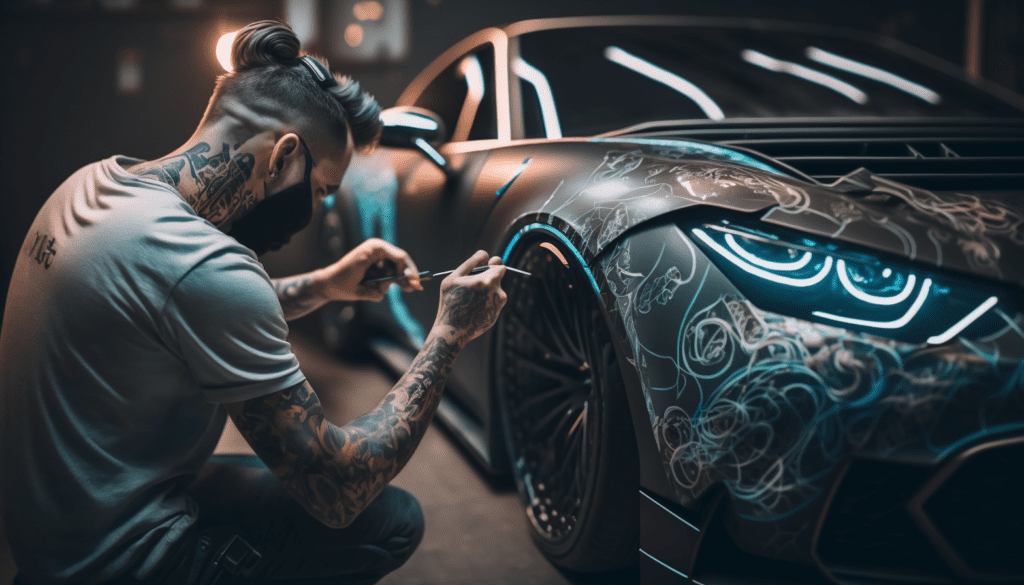Exploring Car Customization and Aftermarket Modifications: Trends, Risks, and Legality in the US


Customizing and modifying cars have been a popular trend for decades, as car enthusiasts look to personalize their vehicles and enhance their performance. From simple cosmetic changes like adding decals or changing the paint color to more complex modifications like engine swaps and suspension upgrades, the possibilities for car customization and aftermarket modifications are nearly endless.
However, while car customization and aftermarket modifications can be exciting and enjoyable, they also come with risks and legal considerations. In this article, we will explore the world of car customization and aftermarket modifications, including the types of modifications available, the legal landscape in the US, the history and trends, the market, the risks and benefits, and the difference between DIY and professional modifications.
Car Customization and Aftermarket Modifications in US
Car customization and aftermarket modifications refer to any changes made to a vehicle that are not part of the original manufacturer’s specifications. These modifications can be purely cosmetic, like adding a new paint job or custom rims, or they can be performance-related, such as upgrading the engine, suspension, or brakes.
Pros Bullet points:
- Enhanced performance and speed
- Improved handling and control
- Increased resale value of the vehicle
- Personalization and unique appearance
- Ability to create a one-of-a-kind car
- Potential to attract attention and admiration
Cons Bullet points:
- Decreased fuel efficiency
- Increased risk of accidents due to modifications
- Possible damage to the vehicle’s engine, suspension, or other systems
- Higher insurance premiums due to modifications
- Reduced reliability and durability of the vehicle
- Risk of violating laws and regulations regarding car modifications
The Legality of Car Customization and Aftermarket Modifications in US
Before making any modifications to a car, it is essential to understand the legal landscape. While many modifications are legal, others are not, and the consequences for illegal modifications can be severe.
In the US, the legality of car modifications varies from state to state. Some states have strict regulations, while others have more relaxed laws. Common illegal modifications include removing emissions control devices, altering the suspension beyond legal limits, and adding illegal window tinting. Consequences for illegal modifications can include fines, impoundment of the vehicle, and even criminal charges.
To avoid any legal issues, it is essential to research the specific regulations in your state and consult with a professional before making any modifications.
The History and Trends of Car Customization and Aftermarket Modifications in US
Car customization and aftermarket modifications have been a part of car culture for decades. From the hot rod and muscle car craze of the 1950s and 60s to the import tuner trend of the 90s and 2000s, car enthusiasts have always looked for ways to personalize and enhance their vehicles.
In 2023, the trend for custom classic cars is expected to continue to rise, with an emphasis on restomods and modern technology integrated into classic designs.
The Market for Car Customization and Aftermarket Modifications in US
The global car modification market is expected to reach USD 63.92 million by 2027, with a compound annual growth rate of 3.45%. This growth is due in part to the rise of the electric and autonomous vehicle industry, which offers new opportunities for customization and modification.
However, the impact of car customization and aftermarket modifications on the automotive industry is complex. While modifications can enhance performance and provide a unique selling point for some manufacturers, they can also create potential liability and warranty issues.
The Risks and Benefits of Car Customization and Aftermarket Modifications in US
Safety is a crucial concern when it comes to car customization and aftermarket modifications. Modifications that affect the structural integrity of the vehicle, like altering the suspension or adding weight, can increase the risk of accidents.
On the other hand, modifications that enhance performance, like upgrading the brakes or adding a new exhaust system, can improve the overall driving experience.
Before making any modifications, it is essential to research the potential risks and benefits carefully and consult with a professional.
Risks:
- Modifications that affect the structural integrity of the vehicle can increase the risk of accidents
- Poorly installed modifications can lead to mechanical failures and safety hazards
- Modifying a vehicle can void the manufacturer’s warranty
- Some modifications can be illegal and result in fines or legal repercussions
Benefits:
- Enhancing the performance of the vehicle can improve the driving experience and increase safety
- Personalizing the vehicle can make it more enjoyable to drive and increase its value
- Upgrading safety features, such as adding a backup camera or blind spot detection, can improve safety
- Modifying a vehicle can create a sense of pride and ownership.
The Risks and Benefits of Car Customization and Aftermarket Modifications in US
Car customization and aftermarket modifications can bring about significant benefits, but they also come with risks. In this section, we will explore some of the safety concerns and precautions that need to be taken when modifying your car, as well as the benefits that customization can bring.
Safety Concerns and Precautions for Car Customization and Aftermarket Modifications in US
When it comes to car customization and aftermarket modifications, safety should always be a top priority. Some modifications can negatively impact your car’s performance and safety, leading to accidents and injuries. To avoid this, it is essential to have a professional mechanic or specialist handle any significant modifications.
Additionally, it’s important to research the safety standards of any modifications you’re considering. Some modifications, such as oversized wheels or tinted windows, can be illegal and compromise safety.
Before making any significant modifications to your car, it’s crucial to consult your car manufacturer’s guidelines and seek advice from a qualified professional.
The Benefits of Car Customization and Aftermarket Modifications in US
Car customization and aftermarket modifications can provide a range of benefits, including improving your car’s performance, aesthetics, and functionality. Customizing your car can also increase its resale value and give it a unique touch that reflects your personality.
For example, upgrading your car’s engine and suspension system can improve its performance and handling, while adding a body kit can enhance its appearance. Installing new technology, such as a GPS system or backup camera, can improve your car’s functionality and safety.
DIY vs. Professional Car Customization and Aftermarket Modifications in US
Car customization and aftermarket modifications can be done either by a professional or as a DIY project. Both options have their advantages and disadvantages.
DIY Car Customization and Aftermarket Modifications: Advantages and Disadvantages in US
DIY car customization and aftermarket modifications can be a cost-effective way to personalize your car. However, it’s essential to have the necessary knowledge and tools to ensure that the modifications are done correctly.
One of the advantages of DIY modifications is that they allow you to have full control over the customization process. Additionally, you can save money on labor costs by doing the modifications yourself.
However, DIY modifications can be risky if you lack the necessary knowledge or tools. Poorly executed modifications can cause significant damage to your car and pose a safety risk to yourself and others.
Bullet points:
- DIY car customization and aftermarket modifications can be cost-effective
- Having control over the customization process is an advantage of DIY modifications
- DIY modifications can save money on labor costs
- Lack of necessary knowledge and tools can make DIY modifications risky
- Poorly executed modifications can cause significant damage to your car
- Poorly executed modifications can pose a safety risk to yourself and others
Professional Car Customization and Aftermarket Modifications: Pros and Cons
Professional car customization and aftermarket modifications offer a higher level of expertise and experience. Professionals have the necessary knowledge and tools to ensure that modifications are done correctly and safely.
One of the advantages of professional modifications is that they offer a warranty or guarantee on their work, providing peace of mind in case anything goes wrong. Additionally, professionals have access to the latest technology and trends, which can result in high-quality modifications.
However, professional modifications can be expensive, and not all modifications require professional services. Additionally, it’s important to research and choose a reputable and qualified professional to ensure that the modifications are done correctly.
Pros Bullet points:
- Higher level of expertise and experience
- Knowledgeable and skilled professionals with the necessary tools and equipment
- Access to the latest technology and trends, resulting in high-quality modifications
- Offer warranty or guarantee on their work, providing peace of mind in case anything goes wrong
Cons Bullet points:
- Can be expensive
- Not all modifications require professional services
- Choosing a reputable and qualified professional is important to ensure that modifications are done correctly
FAQ
No, not all car modifications are illegal. However, some modifications are prohibited by law, and it is important to research and understand the regulations before making any changes to your vehicle.
Yes, you can modify your car’s engine, but you must ensure that the modifications comply with state and federal regulations. Illegal modifications to an engine can result in fines, penalties, and even the revocation of your vehicle’s registration.
Yes, car modifications can affect your insurance premiums. Some modifications can increase the value of your vehicle, while others can increase the risk of accidents. It is important to inform your insurance provider of any modifications you make to your car to ensure that you are adequately covered.
Yes, you can install a turbocharger or supercharger on your car, but you must ensure that the modifications comply with state and federal regulations. Illegal modifications to the engine can result in fines, penalties, and even the revocation of your vehicle’s registration.
It depends on the type of modification and the terms of your manufacturer’s warranty. Some modifications may void the warranty, while others may not. It is important to check with your manufacturer and read the warranty terms carefully before making any modifications.
Yes, you can sell your modified car, but you must disclose any modifications you have made to potential buyers. Failure to disclose modifications can result in legal action and financial penalties.
It depends on your level of expertise and the complexity of the modification. Simple modifications such as adding new wheels or installing a sound system can be done by DIY, but more complex modifications such as engine swaps or suspension upgrades should be done by professionals.
You can research online reviews and ratings, ask for referrals from friends or car enthusiasts, and check the professional’s credentials and certifications before hiring them. It is important to work with a reputable professional to ensure that your modifications are done safely and legally.



